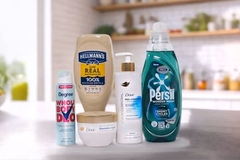EU to ban intentionally added microplastics to cosmetics and household products

27 Sep 2023 --- The European Commission (EC) has adopted measures restricting microplastics intentionally added to products under the EU chemical legislation Registration, Evaluation, Authorisation and Restriction of Chemicals (REACH). This restriction will come into force later this week once it is published in the Official Journal of the EU.
The ban uses a broad definition of microplastics – it covers all synthetic polymer particles below five millimeters that are organic, insoluble and resist degradation.
Cosmetics where microplastics are used for multiple purposes, such as exfoliation (microbeads) or obtaining a specific texture, fragrance or color, will no longer be allowed. The rules will also include detergents, fabric softeners, toys, medicines and medical devices.
“This restriction contributes to the green transition of the EU industry and promotes innovative, microplastic-free products. The EU industry – especially small and medium enterprises – which invested in and developed such products will be more competitive, [environmentally] sustainable and resilient,” an EU official tells Personal Care Insights.
Thierry Breton, commissioner for Internal Market, adds: “This restriction contributes to the green transition of the EU industry and promotes innovative, microplastic-free products – from cosmetics to detergents to sport surfaces.”
“EU citizens will gain access to safer and more [environmentally] sustainable products and the EU industry – especially small and medium-sized enterprises – which invested in and developed such innovative products will be more competitive and resilient.”
The regulation aims to prevent the release of approximately half a million metric tons of microplastics into the environment. Another purpose is to reduce intentional microplastic emissions from as many products as possible.
Enacting the Green Deal agenda
The EC will prohibit the sale of microplastics and products to which microplastics have been added on purpose, which releases those microplastics when used. This works to reduce microplastic pollution from different sources, such as plastic waste and litter.
Microbeads made from plastic in cosmetics will be banned in the EU.The EU Green Deal and the new Circular Economy Action Plan state that the EC is committed to fighting microplastic pollution. In the Zero Pollution Action Plan, the Commission set the target to reduce microplastic pollution by 30% by 2030.
The EU Green Deal vows for the region to become climate-neutral by 2050, while the second iteration of the Circular Economy Action Plan published in 2020, added 35 new actions and set the target of doubling its “circularity rate” – the proportion of recycled material and fed back into the EU economy – by 2030.
“The breakdown of larger plastic articles, such as plastic packaging, is one of the main sources of unintentional releases of microplastics into the environment,” asserts the EU official.
The first measures – that ban microbeads in cosmetics – will start applying 20 days after the restriction enters into force in the EU and Northern Ireland. However, for some cosmetics, the rules can apply after 4 to 12 years, depending on the complexity of the product, the need for reformulation and the availability of suitable alternatives.
Research certified decision
The EC requested the European Chemicals Agency (ECHA) to assess the risk posed by intentionally adding microplastics to products and whether further regulatory action at the EU level was needed.
ECHA concluded that microplastics intentionally added to specific products are released into the environment in an uncontrolled manner and recommended restricting them.
Based on the scientific evidence provided by ECHA, the EC drafted a restriction proposal under REACH that was positively voted by the EU countries and successfully passed in the European Parliament and the Council before being adopted.
When “duly justified,” derogations and transition periods for brands with banned microplastics will be given time to adjust as the new rules apply.
Products used at industrial sites or not releasing microplastics during use are derogated from the sale ban. Still, their manufacturers will have to provide instructions on using and disposing of the product to prevent microplastic emissions.
By Sabine Waldeck













